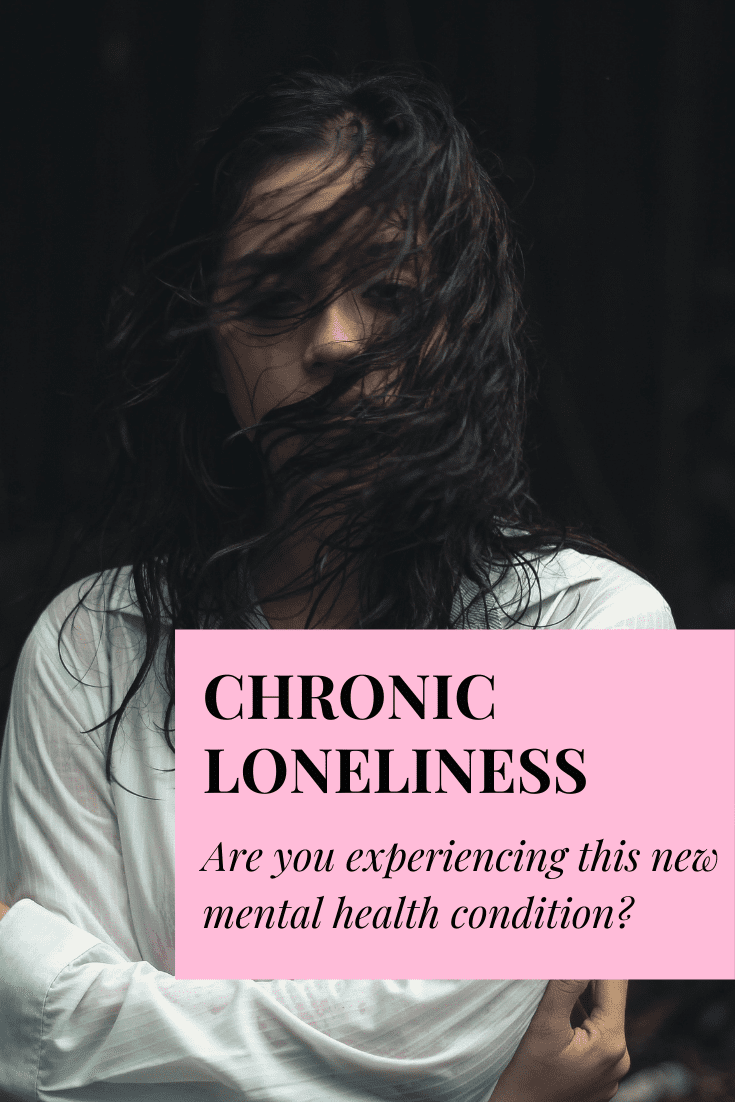Full Disclosure: Clicking on these links could mean a tiny commission for me, at no extra cost to you.
Chronic loneliness is a newly classified mental health condition, with many experts and studies confirming that feeling lonely on an on-going basis can affect your emotional and physical health. You don’t need someone else to help you combat your loneliness either because it can all be done simply by doing some inner work and learning how to enjoy your own company.
What is Chronic Loneliness?
Chronic loneliness, or what many professionals are now calling Persistent Depressive Disorder (PDD),is a new category of emotional and mental health that ties in closely with chronic major depression. It affects approximately 12% of the population worldwide and if you’re one of them, the combination of dysthymia and chronic major depression symptoms can seem unbearable.
What causes Persistent Depressive Disorder?
Like other mental health disorders of its kind, chronic loneliness or PDD is said to be multifactorial, with the interplay of biological, social, and psychological factors pointed as possible causes and risk factors. While its specific etiology and pathophysiology are still being explored by various studies, there is currently strong evidence that neurotransmitters such as serotonin, dopamine, epinephrine, norepinephrine, GABA, and glutamate play a role in causing chronic loneliness.

Signs and Symptoms of Chronic Loneliness
Persistent Depressive Disorder (PDD) can be described as chronic loneliness that went on for at least two years, manifesting continuously with two or more of the following: poor appetite or overeating, insomnia or hypersomnia, low energy or fatigue, low self-esteem, poor concentration or difficulty making decisions, and feelings of hopelessness. Another common sign of this condition is that the symptoms are often debilitating, in that they can hinder the proper functioning in areas pertaining to social, occupational, and many others. In children and adolescents, chronic loneliness can be manifested as an irritable mood and must be present for at least a year.
How is chronic loneliness diagnosed?
Substance abuse and other causes of the disturbance in mood such as schizophrenia must be ruled out as the possible causes of the depressed mood for an individual to be diagnosed properly with PDD. Tests that a doctor may order for someone they feel may have PDD include a physical examination to determine the possible cause of depression, laboratory examination to rule out other causes of the depressed mood, and psychological evaluation to properly diagnose the disorder. Other signs and symptoms and other features mentioned in the medical guides for diagnosing PDD. However, there exists a difficulty in diagnosing this disorder.
For one, PDD often has disease comorbidities, meaning that it may coexist with other mental health disorders in a single individual. Common psychiatric comorbidities include major depressive disorder (thus the term double depression) and anxiety disorder. PDD may also coexist with somatic diseases, the symptoms of which may overshadow the symptoms of PDD, causing it to be overlooked.
Similarly, the chronicity of loneliness that accompanies PDD may be thought of by the one experiencing it to be his or her normal, thus hindering the recognition of the existence of this disorder on its early onset. Moreover, the disorder occurs in varying amplitudes — from mild to severe — and individuals with mild symptoms may easily hide their disorder in social situations. They may also mistakenly think that the disturbances caused by PDD are already innate and are already their personality traits.
According to new research, a strategy that may be employed in addressing this difficulty is showing patients an image, as seen below, that may help them visualize their symptoms and differentiate PDD from major depressive disorder.
What is the treatment for PDD?
Strategies used to address chronic loneliness can be done through pharmacotherapy or psychotherapy, or a combination of both. While studies show that pharmacotherapy is superior to psychotherapy in resolving PDD, there is still evidence that points to the beneficial effects of psychotherapy when combined with pharmacotherapy in patients with PDD.
Prescription medication for chronic loneliness
The usual courses of prescription medication prescribed to patients with PDD are classes of antidepressants. These drugs include selective serotonin reuptake inhibitors (SSRIs), such as sertraline and paroxetine, which work by increasing the production of serotonin, which increases serotonin activity. The usual side effects include xerostomia, sedation, constipation, urinary retention, and cognitive impairments. Caution must also be observed in the administration of this drug with other medications that may increase the amount of serotonin, such as linezolid, as there is a risk of experiencing a severe side effect called serotonin syndrome.
Another class of medications used for chronic loneliness is Tricyclic antidepressants (TCAs) such as imipramine and doxepin. These work by blocking the reuptake of serotonin and norepinephrine in presynaptic terminals, which leads to increased concentration of these neurotransmitters in the synaptic cleft. Usual side effects include constipation, dizziness, and xerostomia.
Serotonin and norepinephrine reuptake inhibitors (SNRIs) such as desvenlafaxine and duloxetine may also be used for PDD, which work by inhibiting the reuptake of both serotonin and norepinephrine. Usual side effects for this class of drug include hypertension, headache, diaphoresis, and bone resorption.
It takes a lot of trial and error before you find out what medication works best for you so patience is also an important aspect of treating the disorder. Note also that these medications must be taken with the supervision of your doctor.
Therapy for Chronic Loneliness
There are also many types of therapy that can help treat chronic loneliness. The treatment approach that gets chosen for you depends on factors, such as the severity of your symptoms and personal preferences. Such different approaches fall into five categories.
Psychotherapy for chronic loneliness
The first of these categories of psychotherapy is psychoanalysis and psychodynamic therapies, largely influenced by the works of Sigmund Freud, in which the therapist works with the patient in discovering their unconscious meanings and motivations.
Behaviour therapy for chronic loneliness
Another category of treatment for chronic loneliness is behavior therapy, influenced by the works of Ivan Pavlov on classical conditioning and E.L. Thorndike on operant conditioning, in which the therapist and the patient look into the way learning influences the behavior of the patient.
Cognitive therapy for chronic loneliness
Cognitive therapy is another possible form of treatment with prominent figures namely Albert Ellis and Aaron Beck presuming that the way people think affects the way they feel and do things and Humanistic therapy, influenced by Jean-Paul Sartre, Martin Buber, and Søren Kierkegaard, in which the rational decision-making of humans are emphasized.
Holistic therapy for chronic loneliness
Finally, integrative or holistic therapy is an approach that, as the name suggests, is a technique in which therapists integrate the concepts of the previously mentioned categories and alter these in accordance with the needs of the patient.
Prognosis
Studies are still limited regarding the course and prognosis of PDD. However, available evidence shows that negative prognostic indicators that predict a bad outcome for the progression of the disorder exist, which include comorbid psychopathology, history of trauma, poor early family relationships, and stress. Studies also show that relapse within 10 years is also a common occurrence for this disorder.
Chronic Loneliness and COVID-19
The COVID-19 pandemic has precipitated an increase in mental health disorders including PDD. Strict lockdowns and social distancing has consequently hastened the development of mental health disorders especially in people who use socialization as means of coping up. The uncertainty of the pandemic has also added an additional stressor that increases the likelihood of developing a mental health disorder.
How to help someone experiencing chronic loneliness?
We can help those who suffer from chronic loneliness or PDD by offering to be a confidante with who they can share their experiences with, without the fear of being judged. Compassion and empathy are key to reaching out with those undergoing PDD and other mental health disorders, and making them feel understood can help them overcome what they are going through.
Chronic loneliness or persistent depressive disorder (PDD) is a disorder of multifactorial causes affecting 12% of people worldwide. It may be diagnosed through the features presented in the DSM-5; however, it is a disorder that is easily overlooked due to its overlap with other disorders. Treatment may be through pharmacotherapy or psychotherapy, or a combination of both, and prognosis may be affected also by several factors such as comorbidities and traumas.
REFERENCES
American Psychological Association. (2009). Different approaches to psychotherapy. Retrieved from https://www.apa.org/topics/psychotherapy/approaches
Chu A, Wadhwa R. Selective Serotonin Reuptake Inhibitors. [Updated 2021 May 10]. In: StatPearls [Internet]. Treasure Island (FL): StatPearls Publishing; 2021 Jan-. Available from: https://www.ncbi.nlm.nih.gov/books/NBK554406/
Mayo Clinic. (n.d.). Persistent depressive disorder (dysthymia). Retrieved from https://www.mayoclinic.org/diseases-conditions/persistent-depressive-disorder/diagnosis-treatment/drc-20350935
Moraczewski J, Aedma KK. Tricyclic Antidepressants. [Updated 2020 Dec 7]. In: StatPearls [Internet]. Treasure Island (FL): StatPearls Publishing; 2021 Jan-. Available from: https://www.ncbi.nlm.nih.gov/books/NBK557791/
Patel RK, Rose GM. Persistent Depressive Disorder. [Updated 2021 Jul 1]. In: StatPearls [Internet]. Treasure Island (FL): StatPearls Publishing; 2021 Jan-. Available from: https://www.ncbi.nlm.nih.gov/books/NBK541052/
Sansone, R. A., & Sansone, L. A. (2009). Dysthymic disorder: forlorn and overlooked?. Psychiatry (Edgmont (Pa. : Township)), 6(5), 46–51.
Sheffler ZM, Abdijadid S. Antidepressants. [Updated 2021 Sep 9]. In: StatPearls [Internet]. Treasure Island (FL): StatPearls Publishing; 2021 Jan-. Available from: https://www.ncbi.nlm.nih.gov/books/NBK538182/
Substance Abuse and Mental Health Services Administration. Impact of the DSM-IV to DSM-5 Changes on the National Survey on Drug Use and Health [Internet]. Rockville (MD): Substance Abuse and Mental Health Services Administration (US); 2016 Jun. Table 3.5, DSM-IV to DSM-5 Dysthymic Disorder Comparison. Available from: https://www.ncbi.nlm.nih.gov/books/NBK519704/table/ch3.t6/
We may receive compensation from BetterHelp or other sources if you purchase products or services through the links provided on this page.










